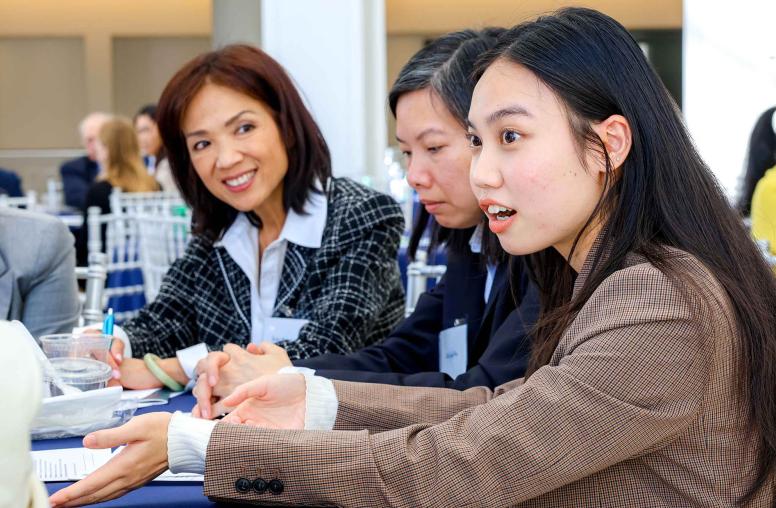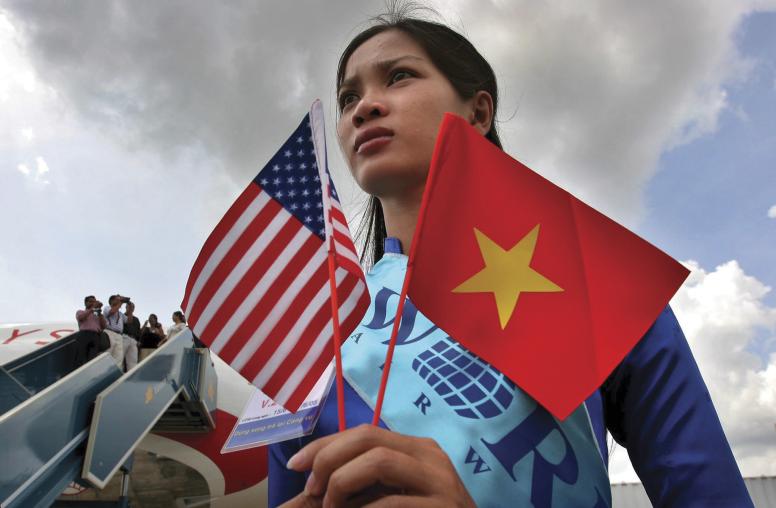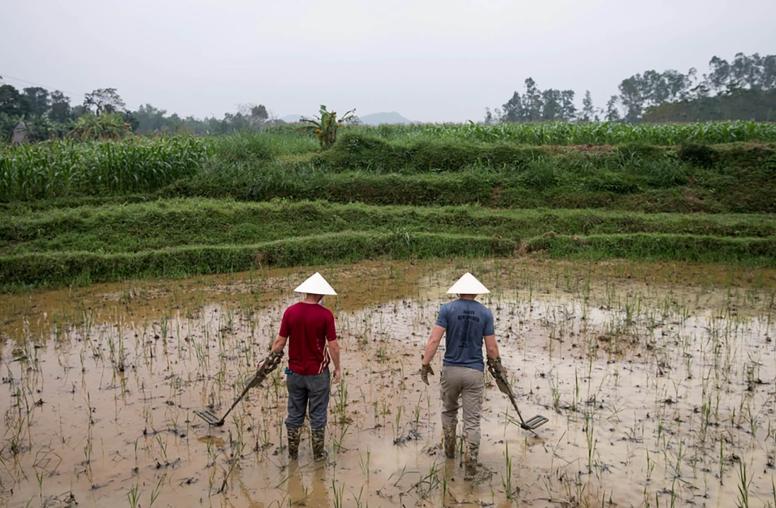Andrew Wells-Dang on Biden’s Trip to Vietnam
The comprehensive strategic partnership announced during President Biden’s trip to Vietnam marks 50 years of progress between the two countries and an “upgrade of the U.S.-Vietnam relationship to the highest level,” says USIP’s Andrew Wells-Dang, while adding a caveat that “it doesn’t mean Vietnam is becoming a U.S. ally.”
U.S. Institute of Peace experts discuss the latest foreign policy issues from around the world in On Peace, a brief weekly collaboration with SiriusXM's POTUS Channel 124.
Transcript
Laura Coates: Joining me now though, for our conversation is Andrew Wells-Dang, a Southeast Asia expert for the U.S. Institute of Peace. He joins us now, Andrew, welcome and good morning. How are you?
Andrew Wells-Dang: Hey, good morning, Laura doing great.
Laura Coates: We're continuing to follow along on what is happening with the G20, but I want if you can speak briefly on this meeting the nature of the Kim Jong Un traveling in this way and for this reason.
Andrew Wells-Dang: I mean, what you've said is correct that Kim Jong Un only goes by train. And that means he's only visited countries that are accessible by train for North Korea, Russia is one of those.
Laura Coates: So, the idea that he's going there, we will continue to follow and the impact and significance of all this, but also, I want to talk to you about what's been happening with Vietnam and United States's relationship. Because, as you heard over the weekend, President Biden celebrating a bit of an upgrade in relations with Vietnam over the weekend, despite some concerns about the country's authoritarian crackdown, and also repression, bring us up to speed and to what, what's happening in Vietnam and why this was so significant.
Andrew Wells-Dang: Yeah, so President Biden is just spent a day in Hanoi, on his way back to the US from the G20 in India. And this is really a historic occasion. It's the first time that Biden himself has ever been to Vietnam, but more importantly, it's an upgrade of the US-Vietnam relationship to the highest level, which is a comprehensive strategic partnership. And as Biden said in his remarks in Hanoi, this is a 50-year arc of progress in our relations from conflicts and normalization to this new elevated status. And it means that the US and Vietnam are going to work together more closely in in many different areas, from economic to educational to dealing with the remaining legacies of the war that we fought more than 50 years ago.
Laura Coates: Why now? Why is this coming now?
Andrew Wells-Dang: Because it's an opportunity for both countries. It's the 10-year anniversary of the first partnership that was signed in 2013, during the Obama administration. And because both countries see it as in their interests to work more closely together. So, the US is doing some things in terms of technology and innovation that that Vietnam is really interested in and the US also benefits in strengthening partnerships with another important country in the Indo-Pacific.
Laura Coates: So, what's interesting to me especially is this idea of, we sometimes can be very reductive in our policy and our understanding of foreign policy that we either have allies, or enemies or friends or enemies. Does this suggest that the US and Vietnam relationship is showing that we don't fit in these neat categories?
Andrew Wells-Dang: That's right. Yeah, there are many countries that we have partnerships with that are not alliances. And this is an example of those. From Vietnam standpoint, they do want to be friends with everyone, but they don't make alliances. Instead, they want to have partnerships with all the major powers and now they pretty much do right. So, they've already had this level of partnership with China and Russia and India. South Korea was the fourth, the US is now the fifth and they're working on expanding it. So, it doesn't mean that Vietnam is becoming a US ally, it means that they have this very well planned out strategy of developing stronger relations with multiple different countries and now the US is one of those.
Laura Coates: It seems to me as more than a semantic though statement to be an ally versus a partner. What's the distinction for foreign policy purposes?
Andrew Wells-Dang: It means that we'll work together on common goals, but we don't have like a treaty with them in terms of military security, for instance, which we do have with the Philippines, for example.
Laura Coates: So, there is I understand also at the USIP just coming up in a few days, the 2nd Annual Dialogue on War Legacies and Peace in Vietnam, Laos, and Cambodia, people can tune in, by the way, to the event via livestream, talk to me about this gathering taking place at USIP.
Andrew Wells-Dang: So, for the last two years, I've been contributing to a war legacies and reconciliation initiative that is largely focused on Vietnam and we also want to bring in Laos and Cambodia since the US war in the region also affected those countries greatly. So, this dialogue is a chance for people from governments and academia and members of the Southeast Asian diaspora in the US, students, many others to gather in person in Washington to share what's happening with cleaning up war legacies, with strengthening relations between Americans and Vietnamese, Lao and Cambodians.
Laura Coates: I am struck by this idea of reconciliation. I mean, there's obviously different ways to view it, you can think about apartheid in South Africa as a policy-based reconciliation, the confrontation of coming to terms with one's history. And you talk to me about of course, war and the inter-country relationships, what does reconciliation look like in a foreign policy world like this?
Andrew Wells-Dang: What's remarkable about US-Vietnam reconciliation is that it's been led by people who have a desire to strengthen ties, because of history. And so, it's been led by US and Vietnamese veterans, so people who fought each other during the war, and want to restore relationships afterwards. It's been led by Vietnamese Americans who came to the US as refugees in many cases and are increasingly going back to invest and live and work in Vietnam and visit their families there. It's led by young people who are curious about Vietnam and realize it's a fascinating culture that we can learn and share from.
Laura Coates: The legacy of the Vietnam War for so many people, and you're right, it's a complicated discussion and it's one that requires the cross generational discussion points on that. Do you have a sense that the people are starting to view either the war differently, or the US presidential impact on the war and beyond or do you think that a lot of this is really set in stone in terms of how it is being described, and the legacy that will remain?
Andrew Wells-Dang: So, one of the activities I've been involved in at USIP is a US-Vietnam youth dialogue. And in talking with students and young people from both countries, it's clear that Americans still see Vietnam mainly through the lens of the war, and what's happened after the war, while the Vietnamese young people see the US in many, many different ways. They've, the war for them is history. It's what happened in their grandparents’ generation, and they've moved on from that. So, it's, I think this new partnership is a chance for Americans to also learn more about contemporary Vietnam and not focus solely on the war. At the same time, there are still effects of the war that we are dealing with, in terms of unexploded bombs and agent orange and the US is cooperating with Vietnam to deal with the human and environmental effects of those.
Laura Coates: Seriously, how do American young people in the conversations you've had, how do they view the Vietnam War?
Andrew Wells-Dang: Most Americans, I think, see the Vietnam War as a mistake, something that we should not have gotten involved into the extent we did, and those decisions had consequences for American lives and many Vietnamese lives and Lao and Cambodians. The question is what we learned from that and are we applying those lessons now in our relations with other countries and other wars going on in the world.
Laura Coates: Really interesting, Andrew Wells-Dang, thank you so much. Tell me more about how we can watch the livestream of the event.
Andrew Wells-Dang: So, on usip.org, the events page, there is a link to the live streamed events. It's on Wednesday afternoon and during the day on Thursday, the 13th and 14th. Welcome listeners to tune in.
Laura Coates: Fascinating. Thank you for joining us. I appreciate your time.
Andrew Wells-Dang: Thank you, Laura. My pleasure.



